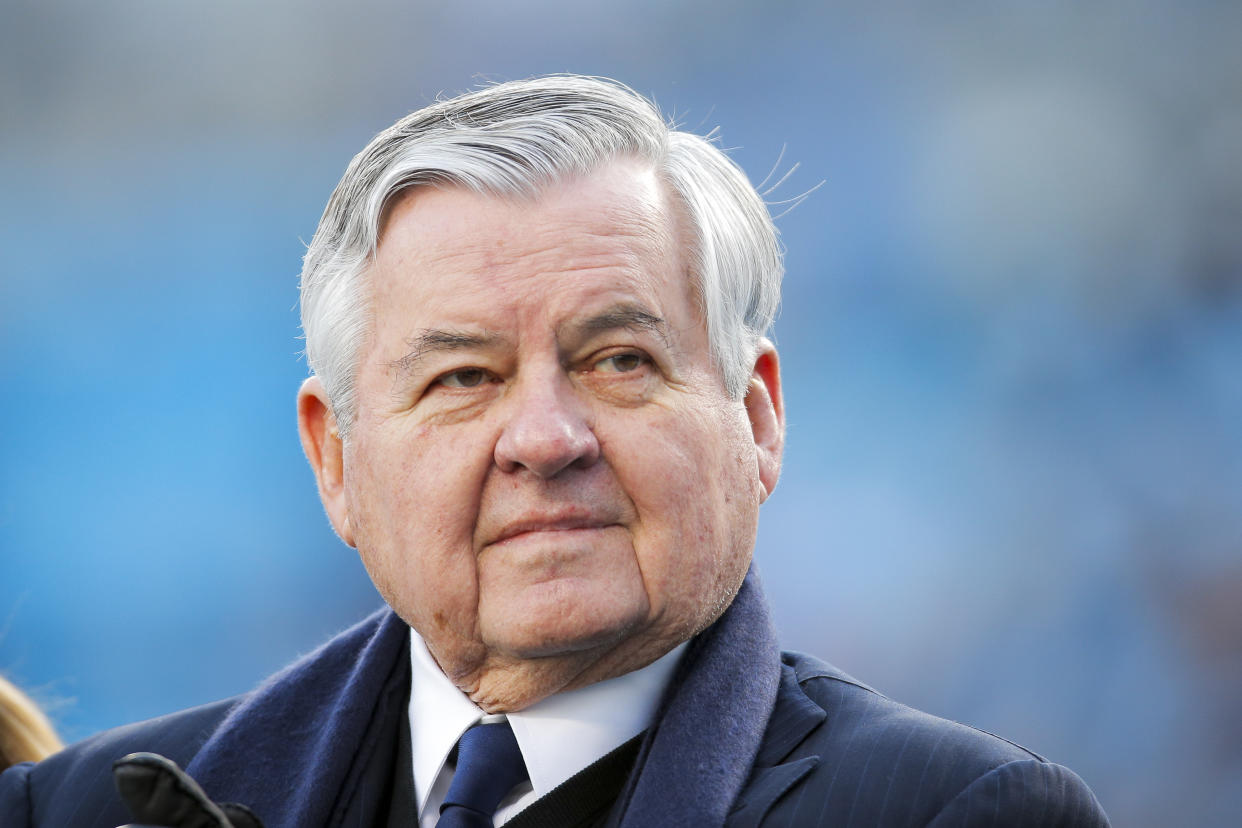Panthers founder, former owner Jerry Richardson dies
Jerry Richardson, the founder and former owner of the Carolina Panthers, died late Wednesday.
The Panthers announced his death on Thursday. The cause of death was not revealed. He was 86 years old.
David Tepper bought the Panthers from Richardson in 2018 after Richardson put the team up for sale amid allegations of workplace misconduct that surfaced in 2017. Tepper and his wife Nicole released a statement on Thursday with their condolences to the Richardson family.
"Jerry Richardson's contributions to professional football in the Carolinas are historic," the statement reads. "With the arrival of the Panthers in 1995, he changed the landscape of sports in the region and gave the NFL fans here a team to call their own."
Richardson was born in the small town of Spring Hope, North Carolina. He played football at Spartanburg, South Carolina's Wofford College and two NFL seasons with the Baltimore Colts from 1959-60. He caught a touchdown pass from Johnny Unitas in the Colts' 1959 NFL championship game win over the New York Giants.
After his NFL career, Richardson opened the first Hardee's restaurant in Spartanburg alongside business partner Charles Bradshaw. The fast-food restaurant expanded into a successful franchise chain, and Richardson went on to found Flagstar, a food service company that became the parent company of Denny's, Hardee's, Quincy's and other restaurant franchises.

Richardson used his restaurant fortune to found the Panthers, which the NFL awarded to Charlotte in 1993. The Panthers joined the NFL for their first season in 1995 alongside the Jacksonville Jaguars.
Amid the Panthers' arrival, Flagstar faced two class-action lawsuits alleging racial discrimination at Denny's that accused the company, among other things, of refusing to serve Black customers. Flagstar settled the lawsuit for $54.4 million in 1994. Richardson left his post as Flagstar chairman in 1995 and resigned from the company later that year in the aftermath of the lawsuit and operating losses.
Richardson cited his new focus as Panthers owner in announcing his resignation to shareholders.
“The time has come for me to once again shift the emphasis in my life to another goal of mine — bringing the Carolinas a Super Bowl championship team within the next 10 years,” Richardson said at a 1995 shareholders meeting.
The arrival of the Panthers in Charlotte was a source of pride for the city and further marked its emergence on the national scene as a banking capital and sports hub. The Panthers played their first NFL season seven years after the Charlotte Hornets made their NBA debut in 1988. The Panthers' Bank of America Stadium was built on the outskirts of a burgeoning uptown district.
The Panthers have yet to meet Richardson's stated goal of winning a Super Bowl. They did find surprising early success alongside the Jaguars as both teams advanced to their respective conference championship games in just their second seasons of existence.
The Panthers advanced to two Super Bowls under Richardson's ownership, losing to Tom Brady's New England Patriots after the 2003 season and to Peyton Manning's Denver Broncos following the 2015 season.
Richardson emerged during his tenure as one of the NFL's most powerful and influential owners. He helped implement the personal seat license system developed by sports marketing executive Max Muhleman that became a controversial model for stadium building in other markets.
NFL commissioner Roger Goodell released a statement on Thursday addressing Richardson's leadership role among NFL owners.
"The Carolina Panthers are a testament to his extraordinary and tireless dedication to the community," the statement reads. "But his league-first attitude as seen through his leadership of numerous NFL committees, including the Stadium Committee and Management Council Executive Committee, helped pave the way for a series of public-private stadium partnerships throughout the country, and collective bargaining agreements that continue to support the growth of the game."
Allegations of workplace misconduct surfaced against Richardson in 2017 and ultimately led to the sale of the franchise to Tepper a year later. An NFL investigation substantiated claims against Richardson that included sexual harassment and the use of a racial slur against a Black team scout. The league fined Richardson $2.75 million.
Richardson sold the team to Tepper under pressure, a sale that was finalized in 2018.
Richardson is survived by his wife Rosalind and children Mark and Ashley. His son Jon Richardson died in 2013 at 53 years old.
